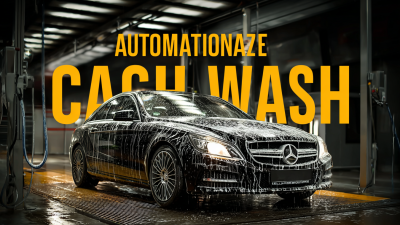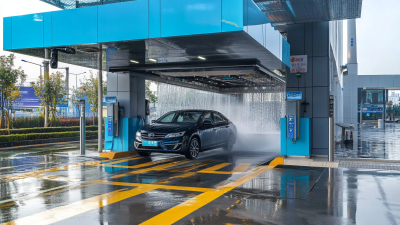Embracing Innovation: The Future of Self Car Wash Machines in Modern Urban Life
As urbanization continues to rise, the demand for convenient, efficient car maintenance options is becoming increasingly crucial. According to a recent report by IBISWorld, the car wash industry is projected to grow at an annual rate of 4.2% over the next five years, reflecting a significant shift in consumer preferences towards self-service solutions.

Self Car Wash Machines are at the forefront of this transformation, offering an innovative way for vehicle owners to maintain their cars while accommodating busy lifestyles. The integration of advanced technology in these machines not only enhances the user experience but also promotes environmentally friendly practices.
As cities become more congested, the rise of self-service car washes represents a promising future in urban efficiency and sustainability, making it essential for stakeholders to embrace these innovations in the car care industry.
The Rise of Self Car Wash Machines in Urban Environments
The Rise of Self Car Wash Machines in Urban Environments
As urban areas continue to grow, the demand for convenient solutions in daily life is more prominent than ever. Self car wash machines have emerged as a practical answer to the urbanite's need for efficiency and sustainability. According to a recent market report by IBISWorld, the self-service car wash industry has seen a staggering annual growth rate of 4.2% over the past five years, driven by the increasing number of vehicles in metropolitan areas. This trend reflects a shift in consumer behavior, embracing automated solutions that save time and reduce the need for traditional, labor-intensive car washes.
One major advantage of self car wash machines is their water efficiency. Many modern systems are designed with water recycling technologies, which can save up to 80% more water compared to conventional washing methods. Additionally, features such as touchless washes minimize physical abrasion, preserving the vehicle's paint in the long run.
Tips: When using self car wash machines, remember to pre-rinse your vehicle to remove surface dirt. This will not only enhance the effectiveness of the wash but also protect your car's finish. Additionally, utilize the available blow drying options to prevent water spots from forming. By leveraging these machines wisely, urban dwellers can maintain their vehicles effortlessly while contributing to a more sustainable lifestyle.
Embracing Innovation: The Future of Self Car Wash Machines in Modern Urban Life
| Feature | Description | Impact on Urban Life | User Preference (%) |
|---|---|---|---|
| Convenience | Allows users to wash their cars anytime without scheduling | Increases accessibility and saves time for urban dwellers | 75% |
| Eco-Friendliness | Uses less water and biodegradable soaps | Mitigates water scarcity issues in urban areas | 68% |
| Payment Flexibility | Supports multiple payment options including app and contactless | Enhanced security and convenience for users | 82% |
| Technology Integration | Incorporates smart features like self-diagnosis and mobile integration | Reduces downtime and enhances user experience | 70% |
| Community Engagement | Promotes local businesses and community gatherings | Fosters a sense of community among urban residents | 60% |
Key Innovations Transforming Self Car Wash Experience
The car wash industry is undergoing a significant transformation, driven by technological advancements that enhance both service efficiency and customer experience. Recent trends indicate that the global car wash service market is projected to grow from USD 41.2 billion in 2025 to approximately USD 69.7 billion by 2033, reflecting an increasing demand for innovative solutions in urban settings. Key innovations in self-serve car wash systems, particularly those focusing on automation and digitalization, are setting new benchmarks and improving overall service speed.
As urban dwellers seek convenient and eco-friendly cleaning options, high-tech car wash systems are rising to the occasion. Advanced equipment and software innovations are not only streamlining operations but also contributing to environmentally conscious practices in the industry. Reports suggest that the overall sales revenue for car washes could reach USD 68.9 billion by 2031, showcasing a robust market fueled by shifting consumer preferences toward quicker and more sustainable car cleaning solutions. This evolution signifies a pivotal shift in how urban residents can embrace the future of self-serve car washes, making them more accessible and efficient than ever before.
Benefits of Using Self Car Wash Stations in Busy City Life
In today’s fast-paced urban life,
self car wash stations offer a convenient solution for busy city dwellers. According to a report from IBISWorld, the car wash industry in the US is expected to grow by 3.3% annually, highlighting the increasing demand for quick and efficient car cleaning options. Self car wash machines not only save time but also allow individuals to maintain their vehicles without the hassle of scheduling appointments or waiting in long lines at traditional car wash facilities.
Utilizing self-service stations can also promote environmental sustainability. Many modern machines are designed to use less water compared to conventional car washes, with some stations utilizing up to 80% less water. This is particularly significant in urban environments where water conservation is becoming more critical. Furthermore, self-service car wash stations typically implement eco-friendly cleaning solutions that reduce harmful runoff into storm drains.
Tip: For the best results, use the foam brush provided at the station to remove grime and dirt effectively, ensuring a thorough clean. Additionally, visit during off-peak hours, usually early mornings or late evenings, to avoid crowds and enjoy a more relaxed car washing experience.
Sustainability Practices in Modern Self Car Wash Technologies
As urban lifestyles evolve, so does the demand for sustainable practices, especially in the realm of self car wash technologies. Modern self car wash machines are increasingly designed with eco-friendly features, using water reclamation systems that recycle and purify water for reuse. This innovation not only conserves one of our most precious resources but also minimizes the environmental impact of washing vehicles in urban settings. By adopting such technologies, car owners can contribute to a greener future while maintaining the cleanliness of their vehicles.
Tip 1:
Look for self car wash facilities that utilize biodegradable soaps and detergents. This ensures that harmful chemicals do not enter the wastewater system, protecting local ecosystems.
Tip 2:
Consider using wash settings that minimize water use, such as touchless systems, which require less water compared to traditional methods. These systems also often employ high-pressure jets that efficiently clean your vehicle while being mindful of water conservation.
As the trend towards sustainability in self car wash technologies continues to grow, it's vital for urban dwellers to seek out and support innovations that respect both their vehicles and the environment.
Tips for Maximizing Efficiency at Self Car Wash Facilities
As urban life continues to evolve, the demand for efficiency and convenience in car maintenance becomes increasingly vital. Self car wash machines have emerged as a popular solution, allowing vehicle owners to clean their cars on their own terms. To maximize efficiency at self car wash facilities, it's essential to follow a few key tips. First, understanding the layout of the facility can save time. Knowing where the vacuum stations, wash bays, and drying areas are located will streamline the process and help avoid confusion during peak hours.
Another crucial aspect is preparing your vehicle before arriving. Removing personal items and ensuring the car is free of loose debris will expedite the washing process and deliver better results. Additionally, utilizing the right tools and products is important. Using high-quality brushes, biodegradable soaps, and spot-free rinse options can enhance cleaning efficiency and protect the vehicle's surface. By focusing on these strategies, car owners can fully embrace the innovation of self service car wash machines, making their urban lives smoother and more convenient.
Embracing Innovation: The Future of Self Car Wash Machines in Modern Urban Life
This chart illustrates the growth in the number of self car wash machines installed from 2021 to 2025, highlighting the increasing adoption of automated car wash solutions in urban areas.
Related Posts
-

Ultimate Guide to Choosing the Best Automated Car Wash Systems for Global Buyers
-

How to Choose the Best Industrial Car Wash Machine for Your Business Needs
-

Top 10 Automatic Car Wash Equipment Manufacturers from China at the 137th Canton Fair
-

Global Success Story: China's Best Self Car Wash Equipment Redefines Quality Standards Worldwide
-

7 Key Advantages of Using an Electric Car Wash Machine for Your Business
-

Exploring Innovative Alternatives to Traditional Car Wash Machines for Efficient Cleaning Solutions